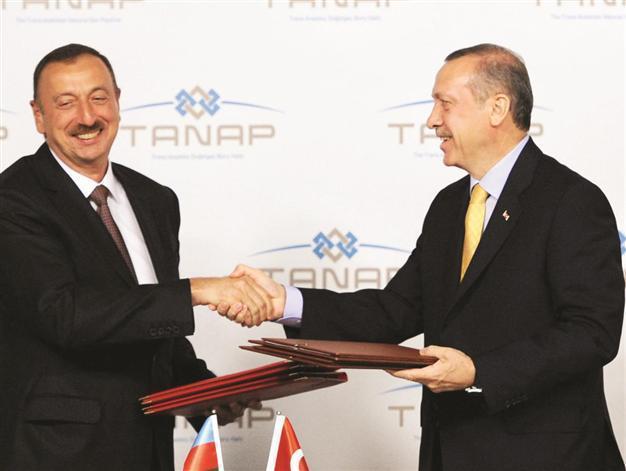Azeri envoy to US lobbying for TANAP
TOLGA TANIŞ WASHINGTON - Hürriyet Daily News

This file photo shows Turkish PM Recep Tayyip Erdoğan (R) and Azeri President
İlham Aliyev shaking hands after signing the TANAP agreement on June 26. DAILY NEWS photo, Emrah GÜREL
Azerbaijani Ambassador to Washington Elin Suleymanov is currently lobbying to explain the importance of the Trans-Anatolian Natural Gas Pipeline (TANAP), a $7 billion project to carry Caspian gas to western Turkey.
“You cannot believe how I am busy these days,” Suleymanov said in a recent interview, adding that he was meeting with key figures across the U.S. to convince them that the project is the “new Baku-Tbilisi-Ceyhan” (BTC) pipeline, which carries Caspian oil through Turkey to the Mediterranean. “I’m trying to explain the importance of the TANAP project to them.”
TANAP is particularly important because no one is discussing the Nabucco pipeline anymore, he said. Nabucco is the southern corridor pipeline that was first considered as a supplier, but which is now unlikely to be built due to the current uncertainty in Iraq.
“TANAP is the most important energy undertaking in the region, there is nothing quite like it,” he said. “It has a global significance, because it connects Central Asia to Anatolia, and further down to
European lands.” Suleymanov said energy security was a global issue, “which is why political support is very important. It is therefore very good to have U.S. support. The BTC would not have been possible without the U.S,” he said. The ambassador’s mission now is to explain the importance of TANAP to key figures in the U.S., from Houston to Washington D.C., as “they do not fully understand it yet.”
Comparison with BTCComparing the approach of the Americans to the BTC and TANAP, Suleymanov said: “At that time [1999] the support of Americans for the BTC was at the presidential level. President Bill Clinton went to Istanbul to sign the declaration with Azerbaijani President Heydar Aliyev, Turkish Prime Minister Süleyman Demirel, and Georgian President Eduard Shevardnadze.”
When Suleymanov was asked about the practical meaning of U.S. support for this kind of project, he said: “The U.S. could work with the Europeans more closely, to help move forward the extension from Turkey to the European market. The U.S. is a global leader, and people listen to what it says,” he said.
Suleymanov said Caspian gas was becoming increasingly significant, and would become a further geopolitical link between the countries in the region, and Europe. “The links between Turkey, Azerbaijan and Georgia, and by extension European countries, would increase. The development of the southern corridor is historically inevitable.”
Regarding the outlawed Kurdistan Workers’ Party’s (PKK) threats against the project, he said: “Turkey is quite a strong and secure nation. I do not really have any concerns about Turkey’s ability to maintain the peace and stability the within country. Incidents happen, but they happen anywhere.”
Suleymanov also made an interesting analogy between the European Union and the gas partnership of the Caucuses. “The European Union was based on a coal union. Why? Because in order to have good ideas in your life, you need to have a warm home. What we have to establish in our region is the basis for cooperation and for expanding integration. Isn’t that in the national interest of the U.S. and Europe as a whole?”
What is TANAP?
The Trans-Anatolian gas pipeline (TANAP) is a natural gas pipeline project which will deliver gas from the Shah Deniz field in Azerbaijan through Turkey to Europe. The pipeline is expected to cost $7 billion. The construction is planned to start in 2014 and to be completed by 2018. The project was announced last November in Istanbul. Four months ago Turkish Prime Minister Recep Tayyip Erdoğan and Azerbaijani President Ilham Aliyev signed an agreement on the pipeline. If built, the capacity of the pipeline would be 16 billion cubic meters per year at the initial stage and would be increased by 2023 up to 23 billion cubic meters.
